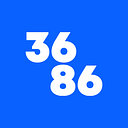36|86 Student Edition 2018 winner: Better patient care with AI
PredictionHealth co-founder on clean data, criticism, and pitching a cranky toddler.
When the PredictionHealth team won last summer’s student pitch competition at 36|86, the business was already a full-time enterprise for co-founders Pedro Teixeira, Michael Poku, and Ravi Atreya. The Vanderbilt Medical School PhD/MD, MD/MBA, and PhD/MD candidates, respectively, conceived the idea while they were completing their residency requirements — and sharing frustrations.
“We wanted to improve the quality of the patient note,” Teixeira said, referring to the document doctors create to detail each patient encounter. “It’s not optimal to have a conversation with a patient while you’re typing into a computer and at the same time considering the best course of action for care.”
With PredictionHealth, doctors can focus solely on patients while AI-assisted software does the scribe work. The result is better care and, eventually, data that can be applied to research.
We caught up with Teixeira to chat about the business.
What’s happened since you won the pitch competition?
We were selected for the MuckerLab accelerator — terrific people to work with. We applied what we learned last year and did a rewrite of our service and software, which we’re actively testing. We’re hoping to launch about five to 10 pilot sites this year with smaller medical practices focused on value-based care and optimizing their operations and logistics.
Besides winning the pitch competition, what did you gain from your experience at 36|86?
It was exciting! We made some good contacts, and LaunchTN put us in touch with great resources for fundraising potential. We were just quietly working away, so it was important exposure for us and also an opportunity to really hone in on our pitch and how to present it in a more broadly applicable way. We’re academically oriented and nerdy, so doing it differently was good.
How did you prepare to pitch?
We spent a lot of time on the slides, and we practiced with The Wond’ry at Vanderbilt — over and over and over again. One of the final things I did to prepare was to pitch my then-2-year-old son, who was in a terrible mood, fussing at me. I thought if I could do it with a rambunctious little guy yelling at me, everything else would be a breeze.
What advice do you have for this year’s 36|86 Student Edition competitors?
Pitch in front of people who will tell you if you’re doing something wrong or if something is confusing. Our mentors at The Wond’ry poked and prodded to help us. So, look for criticism. It’s uncomfortable and not terribly fun, but it’s necessary.
What advice do you have for pre-founder you?
The most difficult lesson — and this is something I always have to improve on — is that you have very little time as a startup and you have to be efficient and quick to find answers. Coming from academia and grad school, we weren’t accustomed to not having time to think and plan and research. And in the startup world you need answers fast. Really embracing that has been valuable — but not something that came automatically.
Also, I would tell myself: Don’t worry about implementing the perfect thing — just figure out if it’s going to work. Make the solution, prove people will pay for it — and then worry about optimizing it later as long as it seems from first principles that it’s feasible. I can’t imagine where you learn that other than by doing a startup.
What’s the biggest challenge you’ve faced in building your business?
Trying to do something hard with very few resources. That’s part of what makes it interesting — and fun.
Where will PredictionHealth be in five years?
Well, besides our three original co-founders, we now have one full-time employee, plus two interns joining this summer. Ideally, our mission has always been about making it easy to incorporate AI into patient care. So, five years from now it would be great to have thousands of patient cases per week, and have the ability to leverage that data to improve care. We want to present doctors with pieces of data they may not have thought to look for — and that creates better patient care. That’s the target.
36|86 Entrepreneurship Festival’s student pitch competition gives student innovators a platform to access funding, marketing, and community and corporate resources. Students from Tennessee colleges and universities are encouraged to apply by May 31. LaunchTN will select 12-15 finalists to participate in the pitch competition at 36|86: Student Edition, Aug. 28-29 in Nashville, for a chance to win a piece of $60K in prizes.
